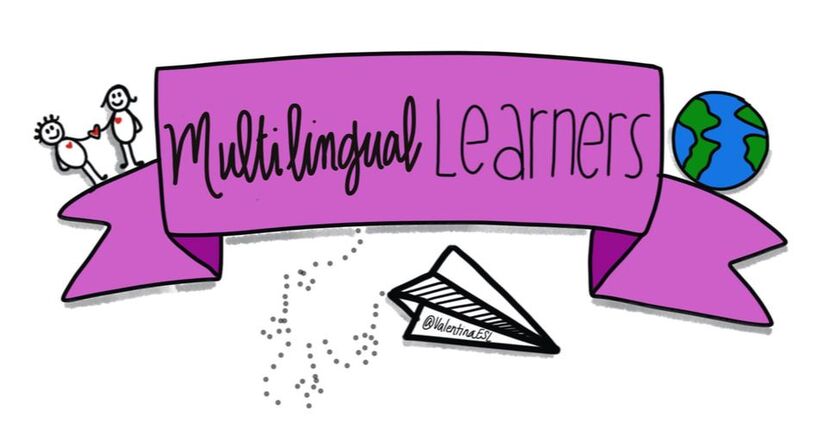|
Recently I read a post on a Facebook group asking whether or not teachers allow their English learners to speak in their primary/native language in class. Now to me, there is no need to think about the answer. It's a no brainer. Do I allow my students to speak in their native language in class? Yes, I believe it's important to allow English learners to use their primary/native language as a leverage to learn their target language...in this case, English. Here's why:
1. Literacy is literacy, no matter the language. By allowing all languages in the classroom, we show that literacy in any language is literacy! If we embrace ALL languages, our students will follow suite. As leaders in the classroom, they look up to us. Creating conditions for language learning means that we value all languages. 2. Even when we don't hear students using their primary/native language, they could be using it in their mind to support learning the target language. For example, when a student is at the beginning proficiency level in English, he may hear the teacher say something in English, translate and process it in his head, and then formulate a response translated back to English. Primary/native language is foundational to learning a new language. The stronger the foundation, the easier it is to build upon. 3. The environment sets the tone for all learning to occur. We can stifle learning by setting rules that take a student's identity from them. When we say "hands to yourselves", that has nothing to do with personal self. Or Don't talk while the teacher is talking. But telling kids they can't be themselves "English Only" in essence means "You can't speak your native language in here" that robs our students of their personal identity. They begin to feel that their native language is bad, wrong, unwanted...like putting our hands on others or talking while the teacher is talking. Reading the posts by educators and even ESL teachers that employ or encourage the English Only Rule, truly hurt me. I can't imagine someone telling me that I can't speak my native language. It would embarrass me. Shame me. Make me feel less likely to speak again. I'm not sure that I would speak any language at all. I think it would lift my affective filter tremendously. Even right now as I write this, I can feel my anxiety rising. It is important and helpful to all teachers to know and understand language development. When we know how language develops, we can use this information to guide instructional decisions for planning and delivering lessons. While it's true that our kids will acquire language more rapidly when they use it, we have to keep in mind that students who know more than one language will rely on their primary language for support at times. This is especially true of students at the beginner levels of language proficiency. In order to accelerate their language development in English, we can provide plenty of opportunities for students to interact and scaffold conversations with sentence frames and word banks. We can also explicitly model expectations and conversational protocols. The conditions we create in our rooms will either help our students grow or they will impede progress. Bottom line...native language supports learning a new language. The "English Only Rule" should not exist in my opinion. And honestly, I didn't realize this was even still a thing until I came upon the Facebook post. I realize this is a touchy topic for some. And I'm sure that not everyone is going to agree with me. Additional Resources: Classroom Q & A with Larry Ferlazzo on Education Week Dispelling the Myth of English Only Colorin Colorado The Home Language: An English Learner's Most Valuable Resource
Melody Whitworth
9/25/2018 01:47:44 pm
I totally agree. Allowing students to converse and even discuss class content in their native language shows them that I value their first language which is connected to who they are.
Mariel GOMEZ DE LA TORRE
5/16/2020 07:56:39 am
I totally agree with you Valentina. Sometimes we (adults) switch languages and I personally don't even noticed. Therefore, I agree we should scaffold, use stem sentences to help them. If a kid needs to use their native language and he or she will produce what we want. I can ensure, English will come naturally. I will tell you a truly story to happen to me. I was teaching English in a bilingual school "Casuarinas" in Lima Peru. This school is a private school were most of the kids travel to NY or Miami even for the weekend, so kids speak fluent English. Well, one of my student was the daughter of the ambassador of Brazil. She spoke no Spanish or English. She learned Spanish really fast as Portuguese and Spanish are similar languages. She had three different English teachers. One for math, one for reading and one for science. I was teaching science at the time fourth grade. The three of us had tried everything that we could but she had her silent period plus she was learning two languages at the same time. She will not even say "Good morning". She will speak in Spanish in less than a month but English we were not able to do anything at all. We continue the three of us corroborating and we were almost arriving to the end of the school year. I remembered like it was yesterday. She will always talked to me in Portuguese which happened that I understand so I was able to help her. It was 1 pm. She came back from recess and she raise her hand, " Ms. Gomez de la Torre, I am so sorry, but you really need to give me permission to go to the bathroom as I am really thirsty and I need to drink water. I know that I needed to go before coming to class but I got distracted. Could you give me permission, please? " You can imagine my reaction first of all "plop" I told her absolutely you may go. After that I call my colleagues as we didn't have that time e-mail or text and we just celebrate. It took her 7 months she used her native language Portuguese while learning Spanish and English. Learn Spanish as quickly as possible because she had a need to have friends, but English she didn't have a need at that time. I guess. It took her 7 month of silent period, but when she was ready, she was really ready. I literally remembered what she told me like yesterday. I truly believe that we need to give the space if the kid need it but they will switch to English when they are ready. Keep scaffold and providing what they need. Love the article by the way! 5/17/2020 06:29:18 am
I totally agree with your this article. It is best for students . we should Allow students to converse and even discuss classroom content in their native language (ESL ) shows them.
Esther Gonzales
10/8/2020 09:42:20 pm
Agree 110%, Valentina!!! 8/25/2021 04:19:35 pm
English Only rule is too strict, and I do not like it. There are moments in class when talking in a native language saves some critical situation of misunderstanding. Sometime this practice is an enormous help for new low level students especially at the beginning of the school year. I think anything in excess is prejudicial, so letting the students speak in his/ her own language all the time also will slow the learning. Comments are closed.
|
Categories
All
|


 RSS Feed
RSS Feed
